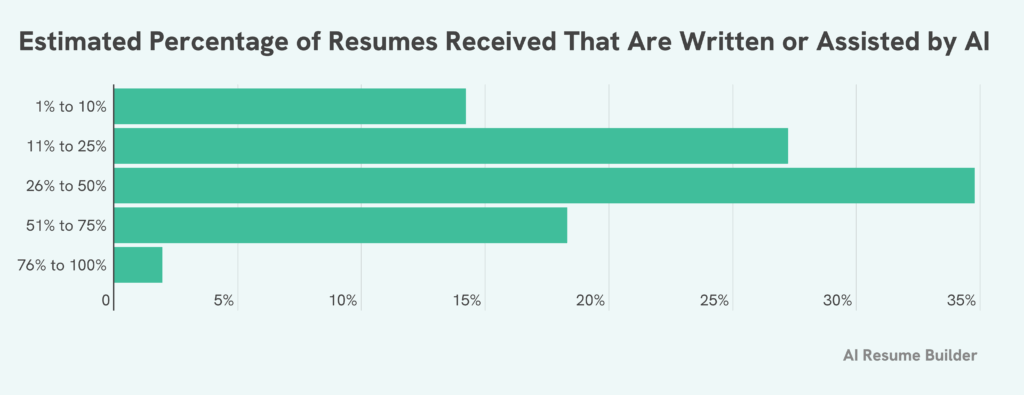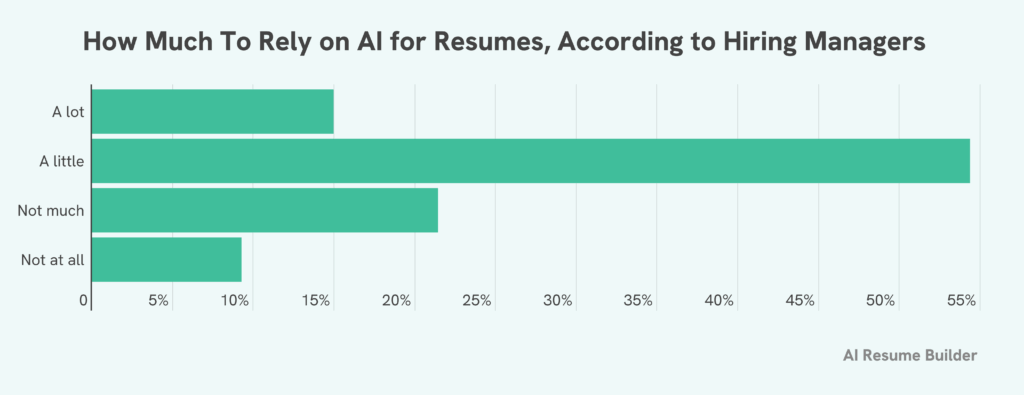AIResumeBuilder.com surveyed 929 hiring managers to understand how artificial intelligence is reshaping the hiring process. The results show candidates are commonly submitting AI-generated resumes that overstate their skills and abilities.
Key findings:
- 1 in 5 hiring managers say more than half of the resumes they receive are AI-generated
- 61% say AI resumes often or always make candidates look more qualified than they are
- 62% have fired employees after discovering skills didn’t match AI-inflated resumes
- 1 in 5 companies are considering pay-to-apply systems to reduce resume volume
1 in 5 Hiring Managers Say More Than Half of Resumes Are AI-Generated
Hiring managers are seeing a surge in AI-generated resumes, with one in five reporting that more than half of the applications they receive are created with artificial intelligence. Nearly 35% estimate that between a quarter and half of resumes are AI-generated, 18% believe the figure is as high as 51% to 75%, and 2% say more than 75% of resumes involve AI.
The number of applicants is also increasing. Nearly three-quarters of hiring managers report receiving more applications than in previous years. Within the first 24 hours of posting a role, 20% typically receive 51 to 100 applications, 19% receive 101 to 500, and 7% say they usually receive more than 500.

Most managers believe they can tell when a resume is AI-generated; 78% say identifying AI-generated resumes is very or somewhat easy. The most common signs include:
- Unnatural phrasing (66%)
- Skills or achievements that don’t align with the candidate’s background (63%)
- Overuse of buzzwords (62%)
- Unusual punctuation, such as em dashes (21%)
6 in 10 Companies Have Fired Employees Whose Skills Didn’t Match AI-Inflated Resumes
AI resumes often make candidates look better on paper than in reality. Sixty-two percent of hiring managers report that AI-generated resumes often exaggerate qualifications, and 49% say candidates frequently cannot back up claims made on their resumes in interviews.
The consequences are real: 37% of companies have fired multiple employees whose skills didn’t match their AI-inflated resumes, while another 25% have let go of at least one.
Regarding reliability, 71% of hiring managers say referrals are more dependable than AI resumes.
“It’s inevitable that candidates will tailor their resumes with the right keywords for their target job, but they need to do it honestly. Incorporate keywords in a way that feels natural and avoid copy-pasting directly from job postings. Your bullet points should reflect how you’d actually talk about your experiences in an interview or networking call,” says AIResumeBuilder.com’s career advisor Rachel Serwetz.
“AI can be useful for breaking through writer’s block, clarifying your achievements, identifying the most relevant keywords, and translating transferable skills. But since many candidates will use similar language, one way to stand out is by adding a professional summary at the top of your resume that gives an authentic, specific overview of your background, strengths, and direction,” Serwetz adds.
Most Hiring Managers Say Candidates Should Use AI, but Only a Little
Most hiring managers don’t reject candidates’ use of AI. More than half (54%) say candidates should use AI a little when writing their resumes, and 15% support heavy use. About 20% say AI shouldn’t be used much, and 9% believe candidates shouldn’t use it at all.

1 in 5 Companies Are Considering Pay-to-Apply Systems
To address the surge in applications, 21% of companies say they have considered a pay-to-apply system; of those, nearly 90% report they are at least somewhat likely to adopt it.
“While a pay-to-apply system might drastically cut down on unqualified applicants, I don’t believe it’s the right solution in today’s economy, especially with so many people unemployed. Instead, companies could require a video application, a skills inventory or assessment, a series of short-form responses, or even a small project or case study. These approaches slow the flow of applications and raise candidate quality without charging people to apply or creating the perception that companies are profiting from job seekers,” says Serwetz.
Methodology
This survey was conducted by AIResumeBuilder.com in 2025 and collected responses from 929 hiring managers responsible for evaluating job applicants and making hiring decisions. Respondents were recruited based on demographic criteria and qualified through screening questions to ensure relevance. The survey has a 95% confidence level and a margin of error of ±3.5 percentage points.